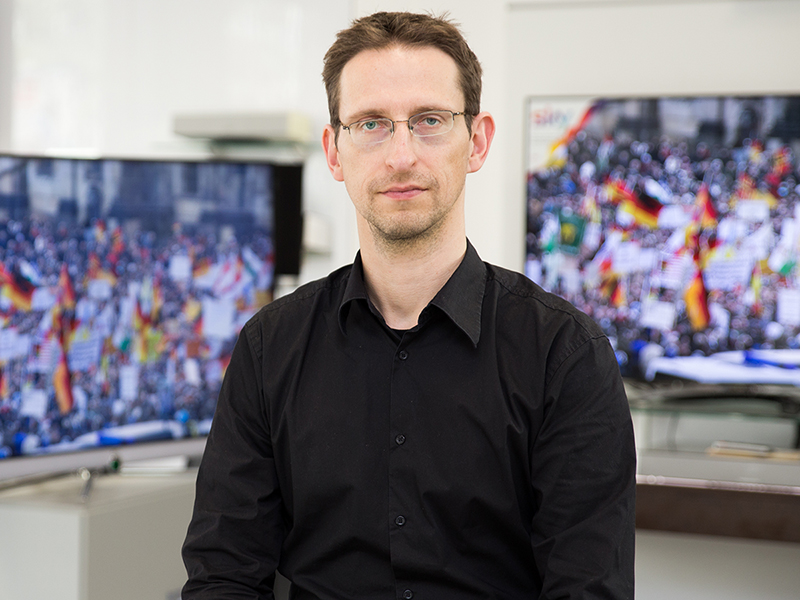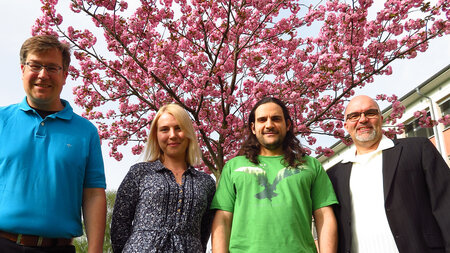One of the Closest Branches of Psychology to Everyday Life
Eleven questions for Jun.-Prof. Dr. Frank Asbrock, Professor of Social Psychology since April 2015
-

Jun.-Prof. Dr. Frank Asbrock: "Social psychology is certainly one of the most-commonly used areas of psychology, because we are in social interactions every day." Photo: Steve Conrad (with support by Master´s Naumann)
Jun.-Prof. Dr. Frank Asbrock (39) has held the Junior Professorship of Social Psychology since April 2015. In eleven responses he gives the readers of “University News“ an insight into his professional background, scientific objectives and activities in Chemnitz.
What is actually meant by “Social Psychology“?
Social psychology is concerned with the experience and behavior of individuals in their social relationships. It asks such questions as: What do we pay attention to when encountering other people for the first time? Why do we let them influence us (or why not)? Why do we act according to social norms and stereotypes? How can the perception that two people belong to different groups lead to discrimination and violence? Social psychology is certainly one of the most-commonly used areas of psychology, because we are in social interactions every day.
The TU Chemnitz is the right choice for me as a junior professor, because…
...I was offered a position here. But beyond that, many professorships were newly occupied at the Institute of Psychology and the Faculty of Human and Social Sciences. This leads to motivated reorganization of the work of all colleagues and creates a very stimulating environment.
Can you say a few words about your academic career so far?
I studied Psychology in Bielefeld, where I also earned my doctorate in the Research Training Group “Group-Focused Enmity“. After a short period working as an academic assistant at the University of Jena, I spent my time as a post-doctoral researcher at the University of Auckland and the University of Marburg.
Describe your years of study in only a few words.
The perfect blend of self-discovery, learning, forming friendships formation, celebrations, unexpected enthusiasm for science, and Arminia Bielefeld.
Did you have role models during your studies who encouraged you to pursue a scientific career?
I particularly remember one lecturer who passed on his enthusiasm for science to me, even though his research topics did not correspond at all to my interests. Beyond that, I benefited a lot from my experience as a student assistant for Wilhelm Heitmeyer and Andreas Zick.
Do you have any advice for young students and graduates?
Study something that really interests you – only then will you find your passion and only then will you excel. Studying offers the freedom and opportunities to think outside the box in your field, whether through involvement within and outside of the university or a minor subject. Take advantage of these chances as well as the very good opportunities to spend a semester abroad.
What would you like to achieve in your teachings in the future?
I want to inspire students to take interest in social psychology and engage them in an active discussion about how the theories we use (which admittedly aren’t always a joy to study) can help to explain social phenomena and current social problems.
What impact does your research have at the TU Chemnitz?
In my research, I deal with prejudice, discrimination and their impact on the affected social groups. On the one hand, I’m concerned with the questions of how and why certain groups are perceived as a threat; on the other hand, the question of how intergroup contact can contribute to reducing these threat perceptions. In Chemnitz, I would like to pursue this research further from an interdisciplinary perspective. Additionally, the question of the impact of discrimination on health issues will be increasingly spotlighted.
There are around 45,000 professors at German universities. What distinguishes you from all others?
Nothing. Well, maybe the ”...but alive“ button on my jacket.
What is your favorite place to show guests in Chemnitz?
Until now, it’s been my kitchen. Previous guests had to fit themselves into the still rather chaotic life of our family in a new city. Otherwise, my presentation of the city depends on the visitors, which speaks for the city’s diversity: With some of my guests I go to the Alternative Youth Center (AJZ), with others I visit the Kunstsammlungen Chemnitz. But everyone is impressed with Kaßberg.
How do you play a part in the life of the city?
My research area wouldn’t make much sense if I didn’t try to establish a relationship with the world outside the laboratory. Therefore, I build contacts with various initiatives in Chemnitz and the surrounding area that support refugees and other low-status groups, and try to help them through my scientific work.
Further information about the professorship at: https://www.tu-chemnitz.de/hsw/psychologie/professuren/sozpsy/index.php.en
(Translation: Nataliia Boiko)
Mario Steinebach
13.11.2015





